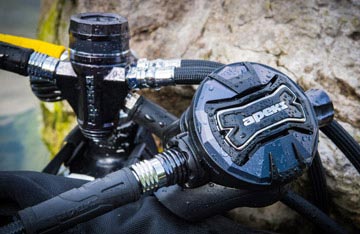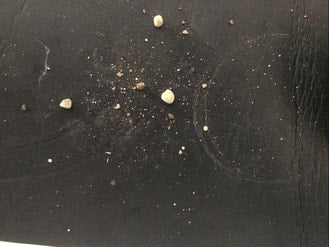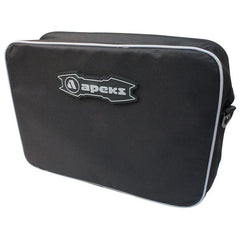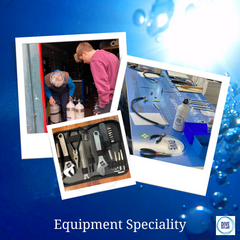Post Dive Care of your Regulators


Why do divers invest a significant amount of money on their life support system but ignore its key after care!
Remember if you look after your equipment it prolongs the life of it and more importantly reduces the chances of it failing on you. This is particularly important where your regulator is concerned. IT IS YOUR LIFE SUPPORT SYSTEM underwater after all.
Do not drag it along the ground - sounds obvious does it not?
Before you get to the cleaning stage, when getting in and out of the water, ensure your equipment is not dangling and being dragged along the ground, particularly if sandy or on a pebbly beach - remember streamlining?
The following picture show you what happens when a service technician is servicing a regulator that this has happened to... it mades a real mess of their service bench!

Cleaning your Regulator after use
Just be certain that you don't get any water into the gear's first stage. The internal parts are vulnerable to damage when they're exposed to water and moisture, so letting them get soaked will probably end up causing you to have to take your regulator to a professional to get fixed.
Prior to rinsing off your regulator, replace the dust cap, securely fastening it on. Of course, make sure the cap is dry first. Yes you can use compressed air that you could get from the cylinder in order to shoot excess moisture out of the dust cap prior to fastening it into place, but please make sure that you do not blast the ears of everyone around you... better still get a towel and dry the cap that way!
Rather than putting the first stage in fresh water to let it soak, just rinse it off under a hose or dunk tank or run under a tap. This will prevent water from seeping past its dust cap. Or you can instead completely submerge the regulator with the first stage attached to a pressurised cylinder. This will also prevent water from entering the unit.
Avoid pressing the purge button on the primary second stage or the octopus during the process of washing the regulator. This will let water into the first stage, which you don't want.
And if you do have hose protectors, be certain you thoroughly rinse beneath them throughout the cleaning process.
Move the low-pressure inflator connector in an effort to get rid of grit, salt, and sand to prevent corrosion and keep the unit performing at its best.
ACD Regulator System
If you have an Aqua Lung regulator with their Auto Closure Device (ACD) system as soon as the regulator is removed from the cylinder valve, it seals the regulator’s inlet fitting therefore keeping water and contaminants out of the regulator’s first stage during rinsing and storage
Want to find out more about the ACD system then have a read of our blog
Drying and Storing Your Regulator after washing
After the regulator has been properly washed, let them dry naturally but not in direct sunlight as this can cause parts to discolour and deteriorate at a faster rate.
Adjustable models should be stored with the inhalation control knob turned all the way out (counter-clockwise), away from the regulator body. This will help to extend the life of the low pressure seat.
When the regulator is completely dry, store it in a clean box or sealed inside a plastic bag. Do not store it where it may be exposed to extreme heat or an electric motor which produces ozone. Prolonged exposure to extreme heat, ozone, chlorine, and ultraviolet rays can cause premature degradation of rubber parts and components.
Never store the regulator while it is connected to the cylinder valve.
Do not use any type of solvent or petroleum based substances to clean or lubricate any part of the regulator. Do not expose any part of the regulator to aerosol spray, as some aerosol propellants attack or degrade rubber and plastic materials.
The hoses on your regulator are best kept as straight as possible to they don’t develop any stress points or crack over time. If you have space, then a long shelf where the hoses can lay flat is the best way to store your regulators. Hanging your regulators from the 1st stage can bend the hoses at the joints so they crack over time so be sure to check your hoses, especially under hose protectors, after long periods of storage.
Regulator Bags

When travelling with your regulators then travel with them in a regulator bag as this protects them from impact and shock
Do not store your regulators for long periods
Over long periods of storage, 6+ months, parts inside your regulator can perish and need replacing. O-Rings and other sealing parts are made to be soft to create an effective seal but if not used they will become harder and brittle. Try to use your regulators once a month or so to keep the parts moving freely and get your regulators tested or serviced if they’ve been in storage for 6 months or more.
Servicing Regulators
Have your regulator serviced according to the manufacturers recommendations or if you have stored it away and not used recently. Never dive on your regulator if you don’t trust it to perform flawlessly, even in an unanticipated out-of-air emergency where a much greater demand is placed on it.
Generally the servicing recommendations are serviced every 2 years / 200 dives but with visual inspections in the 'off years' i.e
1st Year: Visual Inspection
2nd Year: Full Service
3rd Year: Visual inspection; so on and so forth BUT IF in doubt, have them serviced.
Note:
It is recognised that some people service their own regulators! this is not recommended and most manufacturers make it clear that their regulators have to be serviced by authorised service technicians who have undertaken THEIR factory training but we know that service parts can be purchased over the internet.
Dive Professionals - your regulators do need to be serviced in line with the manufacturers recommendations AND here in the UK the HSE requirements for Recreational Diving Projects: Diving at Work Regulations 1997: Regulation 6 Maintenance of diving equipment clearly says
The diving contractor should ask divers using their own diving equipment to confirm that it has been serviced in accordance with the appropriate equipment supplier’s service schedule and that all the cylinders have been tested for fitness-for-use in line with statutory requirements under other regulations. Prior to the dive, this should be confirmed to the supervisor and recorded in the diving operation record for his or her operation.
Observations on Regulator Care and Servicing
Regulators do not generally make a noise - only the general noise of a regulator exhaust valve when you breath in and out. Other noises can be eliminated and can be the first sign that something is not quite right with your regulators.
No matter who services your regulators, always test them in a pool prior to open water diving
Tropical dive masters are not always competent service technicians!
There is generally a direct correlation between how quickly you want your regulator serviced and how badly the service is needed
Just because you bought it "New - in the box" on any internet selling site doesn't meant it isn't 20 years old and service parts haven't been available for a number of years. "New" describes the condition, not the age.
We recommend that any purchases of ANY secondhand regulators from secondhand internet sites are serviced prior to use.
How do I learn more?

The Equipment Techniques course prepares you to undertake basic scuba equipment maintenance, shows you how to care and adjust your equipment. In addition you will learn interesting background information about your equipment works. How it's repair and other information helps you with your equipment investment. The more you know about how your dive equipment works, the more comfortable you are with it, the better performance you get from it and the better you can care for it.
So what are you waiting for get yourself booked in.
Do you Sell Regulators?
Yes we do sell regulators here at Dive Rutland, pop in and have a chat about your requirements and we will be happy to advice or have a look at our Regulator Collection
Not sure about how to choose a regulator then have a read of our Choosing Regulator Article










